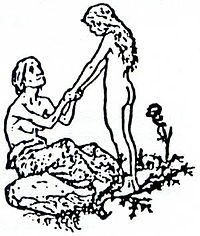Gutter songs
The gutter songs are a commissioned production of the Berliner Festspiele in the series “Views of Prussia” from 1981. The chanson cycle is based on the song and poetry collection Lieder aus dem Rinnstein (Ed. Hans Ostwald 1903/1904/1906 ff.). The texts date from around 1864 to 1925: poetry from the turn of the century, urban poetry , texts from naturalism and bohemian .
The texts were set to music as chansons and staged by Holger Münzer . The world premiere with live recording was on the occasion of the Berliner Festwochen on September 28, 1981 in the Hebbel Theater Berlin. This was followed by other performances at Berlin theaters and on tour (e.g. Lower House Mainz ). The almost completely forgotten songs from the gutter thus became part of German chanson culture again.
content
The action takes place in a turn-of-the-century pub and on the street.
Acting persons are: the bar hostess, the vagabond, the starving author, the thinker.
It is about the situation of the authors of the time, the bourgeois view of the bohemians on this social need, the situation of the socially disadvantaged classes of the population and the Berlin prostitute as well as the pimps and the crime reports of the time (see Leo Heller ). It is also about the Prussian authorities and the old braids of the hierarchy , the emerging industrialization, initially with day laborers and unskilled workers, the poverty of the socially disadvantaged population groups and their misery, the housing shortage and the economic hardship of the employees, all of this taking into account the Imperial times and efforts to prevent a social state.
Kaiser Wilhelm II.
In a speech on December 18, 1901 on the unveiling of the statues in Siegesallee, Kaiser Wilhelm II said on the subject of "The true art":
“An art that defies the laws and barriers described by MIR is no longer art, it is factory work, is trade, and art must never become that [...] If now art continues, as it is now in many cases does nothing but make the misery even more hideous, as it already is, then she will sin against the German people. The cultivation of ideals is at the same time the greatest work of cult, and if we want to be a model for other peoples in this, the whole people must work with it; and if the Kulthur is to fulfill its task fully, then it must have penetrated into the lower strata of the people. It can only do that when art offers its hand to raise it instead of descending into the gutter . "
The housing shortage of the poorer classes
(From the magazine Die Gartenlaube 1889)
“The scenes of the overcrowding of the apartments, which the novelists depict the reality, still lag behind the reports of the city missions. The mischief of the so-called 'sleepers' no longer allows family life to arise, poisons the minds of children, undermines all moral feelings and often turns such overcrowded apartments into breeding grounds for crime. It is clear that there is no longer any question of health care, even to a limited extent, in such apartments; The rooms themselves in the basement apartments and attic apartments are also unhealthy. "
To prostitution
Here is a funny and concise text example on Berlin prostitution (text: Georg Latz , composition: Holger Münzer ).
[...]
Of course, mom and daughter got older and older.
And over time, Mama let
the uncles grow colder.
And mom stayed at home
and said - with confidence -
"Jeh, Mieze, now all out,
you know meene Jejend."
Then it went day in and day out, then
exactly the same end day in and out,
the blooming little daughter,
the angel horn in her hands.
And when it saw an uncle,
it said, even
without being asked ,
"I have now
inherited from my mother."
(This chanson and others as audio examples: see web links)
Title sequence
- True Art (Kaiser Wilhelm II. )
- Phantasus ( Arno Wood )
- Hardship ( Ada Christians )
- Amanda ( Erich Mühsam )
- Vagabundentod ( Fritz Binde )
- Song of the Stone Knocker ( Karl Henckell )
- Diplomats (text and music by Frank Wedekind )
- Lullaby ( Margarete Beutler )
- Declaration of love ( Ludwig Scharf )
- Street scene ( Emil Nicolai )
- The steamroller ( Karl Henckell )
- See the two there ( Karl Henckell )
- Coal ( Alfons Petzold )
- Street trade ( Sigmar Mehring )
- The end of 't Lied ( Albrecht Voigtländer )
- Behind the fence (Martin Drescher)
- In Mulackstrasse ten (folk tune around 1900)
- The mother's inheritance ( Georg Latz )
- Confusion ( Ferdinand Avenarius )
- Ilse (text and music by Frank Wedekind )
- What must be must be ( Albrecht Voigtländer )
- The running girl ( Ernst von Wolzüge )
- Claim (text and music by Frank Wedekind )
- Berlin Moritat ( Leo Heller )
- I love but I despise you ( Leo Heller )
- The Last Night ( Hans Hyan )
- The aunt killer (text and music by Frank Wedekind )
- Socialist Law (Section 11 of 1878)
- Lord show me ( Oskar Panizza )
Web links
- Chanson cycle Rinnsteinlieder 1981: Program booklet saved on archive.is, accessed on June 10, 2015 ( Memento from February 11, 2013 in the web archive archive.today )

